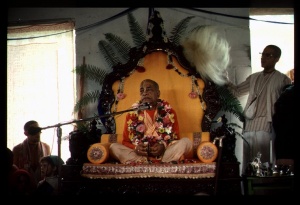CC Madhya 6.102 (1975): Difference between revisions
(Vanibot #0027: CCMirror - Mirror CC's 1996 edition to form a basis for 1975) |
(Vanibot #0020: VersionCompareLinker - added a link to the Version Compare feature) |
||
| Line 2: | Line 2: | ||
<div style="float:left">'''[[Sri Caitanya-caritamrta (1975)|Śrī Caitanya-caritāmṛta (1975)]] - [[CC Madhya (1975)|Madhya-līlā]] - [[CC Madhya 6 (1975)|Chapter 6: The Liberation of Sārvabhauma Bhaṭṭācārya]]'''</div> | <div style="float:left">'''[[Sri Caitanya-caritamrta (1975)|Śrī Caitanya-caritāmṛta (1975)]] - [[CC Madhya (1975)|Madhya-līlā]] - [[CC Madhya 6 (1975)|Chapter 6: The Liberation of Sārvabhauma Bhaṭṭācārya]]'''</div> | ||
<div style="float:right">[[File:Go-previous.png|link=CC Madhya 6.101 (1975)|Madhya-līlā 6.101]] '''[[CC Madhya 6.101 (1975)|Madhya-līlā 6.101]] - [[CC Madhya 6.103 (1975)|Madhya-līlā 6.103]]''' [[File:Go-next.png|link=CC Madhya 6.103 (1975)|Madhya-līlā 6.103]]</div> | <div style="float:right">[[File:Go-previous.png|link=CC Madhya 6.101 (1975)|Madhya-līlā 6.101]] '''[[CC Madhya 6.101 (1975)|Madhya-līlā 6.101]] - [[CC Madhya 6.103 (1975)|Madhya-līlā 6.103]]''' [[File:Go-next.png|link=CC Madhya 6.103 (1975)|Madhya-līlā 6.103]]</div> | ||
{{CompareVersions|CC|Madhya 6.102|CC 1975|CC 1996}} | |||
{{RandomImage}} | {{RandomImage}} | ||
==== TEXT 102 ==== | ==== TEXT 102 ==== | ||
| Line 20: | Line 19: | ||
<div class="synonyms"> | <div class="synonyms"> | ||
iti—thus; dvāpare—in Dvāpara-yuga; uru-īśa—O King; stuvanti—offer prayers; jagat-īśvaram—unto the Supreme Personality of Godhead; nānā—various; tantra—of the supplementary Vedic | iti—thus; dvāpare—in Dvāpara-yuga; uru-īśa—O King; stuvanti—offer prayers; jagat-īśvaram—unto the Supreme Personality of Godhead; nānā—various; tantra—of the supplementary Vedic literature; vidhānena—by regulative principles; kalau—in the Age of Kali; api—certainly; tathā—so also; śṛṇu—hear. | ||
</div> | </div> | ||
| Line 27: | Line 26: | ||
<div class="translation"> | <div class="translation"> | ||
" 'In the Age of Kali, as well as in Dvāpara-yuga, the people offer prayers to the Supreme Personality of Godhead by various mantras and observe the regulative principles of the supplementary Vedic literature. Now please hear of this from me. | |||
</div> | </div> | ||
| Line 34: | Line 33: | ||
<div class="purport"> | <div class="purport"> | ||
This is a quotation from Śrīmad-Bhāgavatam ([[SB 11.5.31]]). | This is a quotation from Śrīmad-Bhāgavatam ([[SB 11.5.31|11.5.31]]). | ||
</div> | </div> | ||
Latest revision as of 18:26, 27 January 2020

His Divine Grace
A.C. Bhaktivedanta Swami Prabhupada
A.C. Bhaktivedanta Swami Prabhupada
TEXT 102
- iti dvāpara urv-īśa
- stuvanti jagad-īśvaram
- nānā-tantra-vidhānena
- kalāv api tathā śṛṇu
SYNONYMS
iti—thus; dvāpare—in Dvāpara-yuga; uru-īśa—O King; stuvanti—offer prayers; jagat-īśvaram—unto the Supreme Personality of Godhead; nānā—various; tantra—of the supplementary Vedic literature; vidhānena—by regulative principles; kalau—in the Age of Kali; api—certainly; tathā—so also; śṛṇu—hear.
TRANSLATION
" 'In the Age of Kali, as well as in Dvāpara-yuga, the people offer prayers to the Supreme Personality of Godhead by various mantras and observe the regulative principles of the supplementary Vedic literature. Now please hear of this from me.
PURPORT
This is a quotation from Śrīmad-Bhāgavatam (11.5.31).